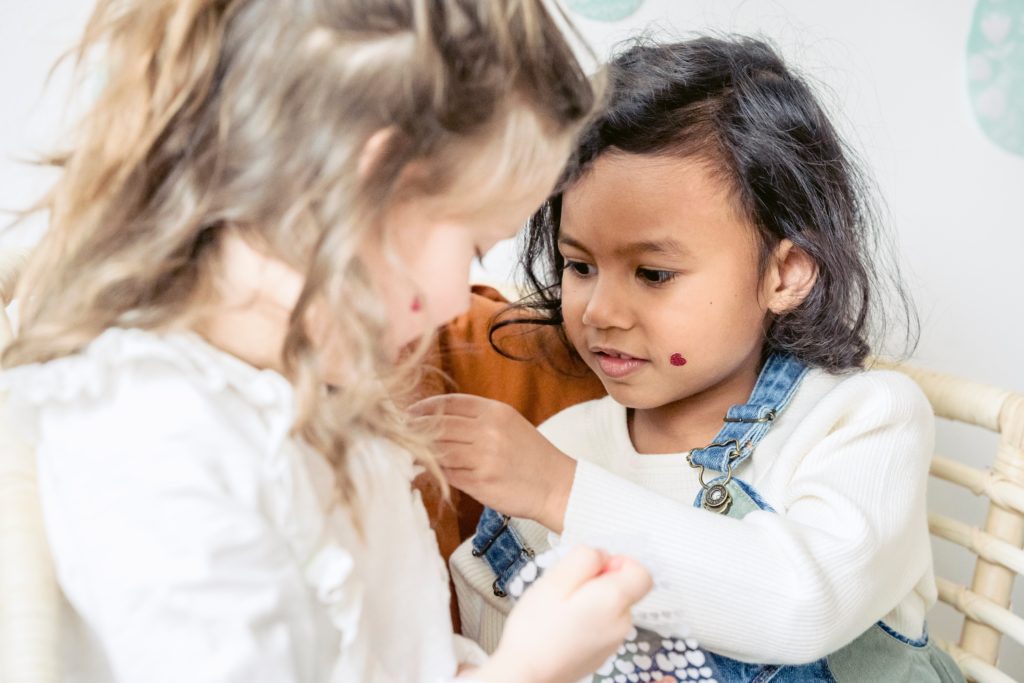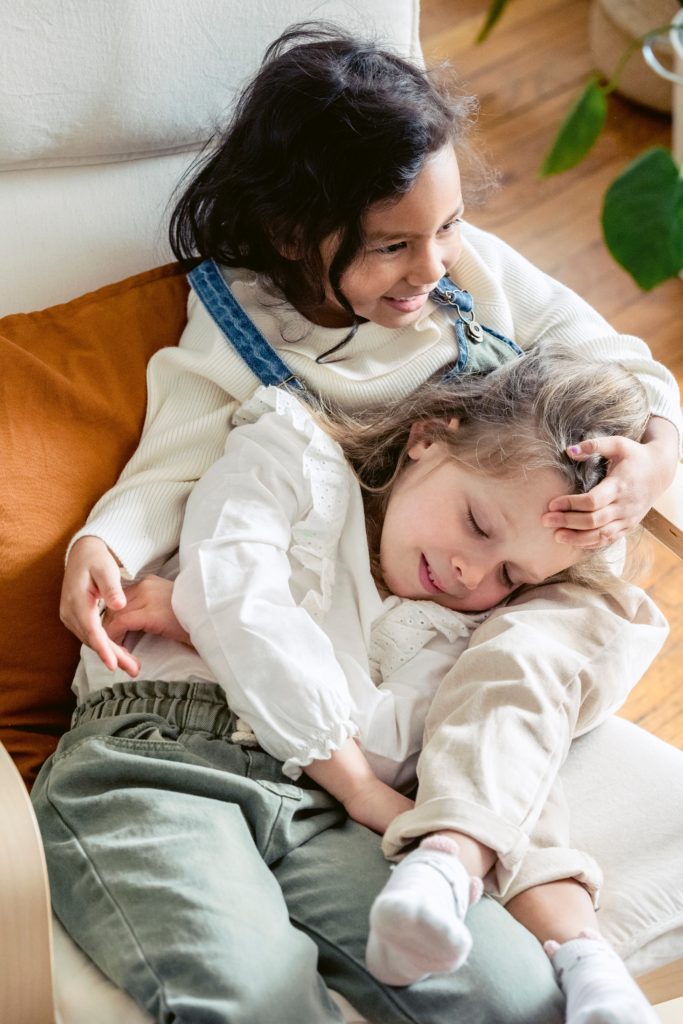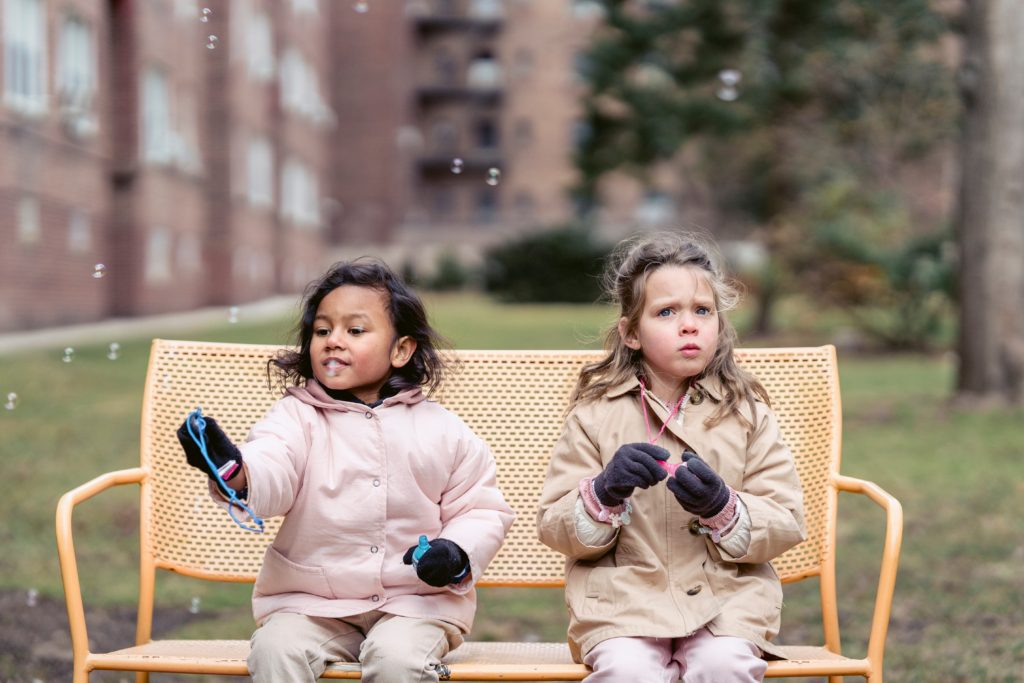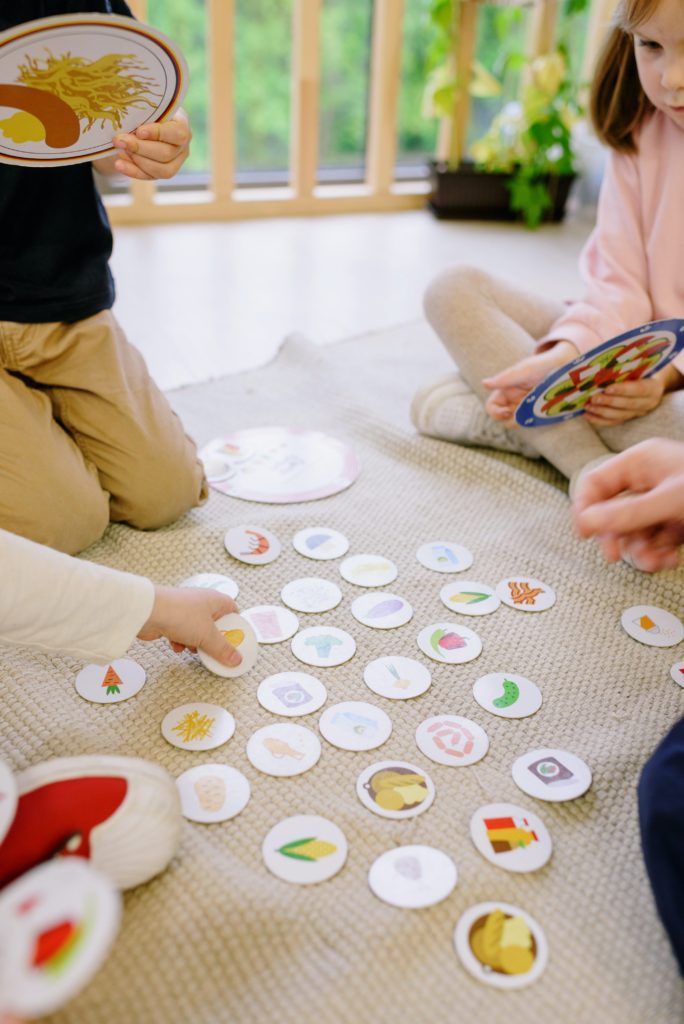
Kindness is the quality of being friendly, generous, and compassionate. It means to treat everyone respectfully and sincerely trying to make everyone feel better, including oneself. Kindness can’t be given to the detriment of others, and not with selfish purposes.
Kindness is free. Being kind doesn’t take anything away from you. And in any circumstance, kindness is going to make things better, never worse.
There are some attitudes that are often confused with kindness.
Constant praise is not kindness, it’s insincere. Lack of boundaries is not kindness. Extreme positivity is not kindness either, and I don’t think it is a good attitude either.
Long-term strategies to encourage kindness in siblings
Model kindness by being kind
Most things are best taught by example.
There are many ways to spread kindness around. Being patient in traffic, speaking loudly to older people that can’t hear, asking things nicely to your partner, appreciating the people in your life…
Your kids see you and they are going to be little copies of you. The kinder you are to them, to their sibling, to other people, and even to yourself, the kinder they will be to each other.
I’m sure every parent has lived this moment when you hear your kids use an expression that is very characteristically yours. It’s going to happen many times. If you model kindness, some of those moments will be moments of kindness between siblings.
Model giving grace to your spouse
The ability to let things roll off our backs is undervalued. Can you imagine the joy that would fill your house if everyone just let go of the small petty things that make you mad?
I’m the worst at this, but when I have really made an effort to let things go, I assure you it makes everyone so happy! You just have to remind yourself how much you love your family every time something slightly annoying happens. It’s easy to forgive the people you love. And many times, you can handle being annoyed much better than your spouse can handle disappointing you.
The kids will start to let things roll off their backs immediately. They will have less conflict, and when they do, maybe they can laugh it off!
Be kind in your discipline
When we correct our kids, we are trying to shape their behavior to make them act in a way that is acceptable in our eyes. I’m sure that our instructions often feel arbitrary to them. From their perspective, we might as well be making up the rules of the world on the spot.
When children of different ages play, the oldest will take the leading role frequently. They may correct the youngest to make them follow the rules of the game. It’s normal, they are used to the dynamic of power and recreate it.
If you send your child to time out when you think they are misbehaving, they will send each other to time out when they are playing. If you raise your voice, they will raise their voices to each other.
However, if your discipline is kind and peaceful, they will still have some power dynamic in their play, but it won’t always be in the same direction, and it will be kind and loving.
When you use kind discipline, they learn that leaders correct you because they care about you.
Apologize and teach your children how to apologize
Saying “I’m sorry” and nothing else is not a proper apology in most cases.
To apologize to young children, first acknowledge everyone’s feelings, yours and theirs, what happened, and how that hurt them. Then apologize, and ask them if there is something you can do to make them feel better. And keep a note to yourself to not hurt them like that next time.
Is there such a thing as apologizing too much?
There are two ways you could apologize too many times to your children. First, if you keep taking responsibility for their wrongs. And second, if you are making mistakes and repeating the same mistakes without working on becoming a better parent.
You can repair things when they break, but eventually, you can’t anymore, right?
Apologizing to young children when you did something wrong to hurt them will gain you their respect, not the other way around like some of us were told.
Forgive and encourage forgiveness between siblings

You can forgive without getting an apology first. This is especially relevant when one of your kids is too young to understand what they did wrong, or too young to be in control of their emotions.
You can say:
I know you don’t want to hurt me, and I forgive you. We don’t hit people because hitting hurts.
If you say this enough times, or some different words to express the same sentiment, your kids will start to copy you and forgive each other without further expectations.
Have more than enough love for each of your children
I know you love your children with all your heart! You would do anything for them, and you do. You only think about what is best for them.
Parenthood is difficult, especially difficult if you are the type of person who would try to think about how to encourage kindness in siblings.
Parenthood is very difficult because you can always find ways to do better. Wouldn’t you prefer to be having a nice bath instead of looking around the web trying to find out what you could do to help your kids be kind to each other?
I hope I have made my point clear: it’s difficult. And it’s very easy to get lost, to worry about all the things that you need to do, to teach, to plan…
Remember to give yourself grace and allow yourself to enjoy your children. Laugh with them, be a little flexible with the rules, sometimes, and show them love. Show them love in different ways, in their own love language.
If they feel loved no matter what, they will feel less competition between them. There is enough love for everyone, so there is no need to compete for it.
Look for kind family friends
This one is a little tricky, I think. There is a difference between being tolerant and making friends with everyone.
It’s good to be tolerant of people from different backgrounds and to not be judgemental of others before knowing them. All people deserve respect. But not all behaviors are acceptable.
No one has to tolerate mean behavior from other people.
We can decide who we make friends with, and our kids can decide for themselves too.
If your best friend from school has kids that are unkind to yours, start to separate your time with your friend from your family.
It isn’t always possible to be selective with the friends or the family that you keep around. When you have to spend time with people that wouldn’t be a good influence, you can still make plans that don’t allow a lot of problematic behaviors around your kids and without your presence.
For instance, if a friends’ kids are a little mean when they get carried away, try to meet them in a quieter environment and with supervision, like at your house or backyard. Be directly involved in the time they spend together.
Help your kids make good friends that are kind

If you are reading this, you probably want your kids to be friends for life, right?
Siblings are the first people to teach you social skills at the level of peers, especially if they are somewhat close in age. You can do a lot of work in teaching them to be kind to each other at home.
Here is why I think 2 years is the perfect age gap between siblings.
But also, the relationships that they create outside of the home with other kids, and the behaviors that they see in other families are going to transfer to their siblings’ relationships.
So you can encourage kindness in siblings by helping them make good friends that are kind and loving to them and others.
Try to know the families in your children’s class
Regular school goes for so many hours of the day! Your children’s friends will have a huge impact on their lives and personalities.
I think it would be good to try to know the families in their class and try to foster good relationships with some families that you align more with.
They can get comfortable with other kids with your guidance, so you can teach them to interact kindly with each other, in a similar way that you would encourage siblings to love each other at home.
You can help your kids make good friends from school and they can keep their relationships in and outside of the class.
At the same time, families need family friends too, and in this way, you all could all get fantastic friends for yourself. Children with children and parents with parents.
Be involved in the school
Most people view schools as a way of keeping your child safe, happy, and learning while you work. I think we underestimate the influence school makes on someone’s happiness and character even long term.
Talk to their teachers, ask them how your kids are doing, if they make friends, if they are generally part of the group or if they are isolated.
The environment in school and how they are treated by the people in school will transfer to home and how they treat their siblings.
By being involved in the school, you will be able to keep an eye on what happens when they are not with you, and if they are struggling socially you will be able to intervene and help them be confident in their social skills and their moral compass.
Short-term strategies to encourage kindness in siblings

Get along jar for siblings
This is a straightforward concept, and really flexible.
You know your kids and what they need to feel loved. Put some pieces of paper with instructions on giving a kind gesture to the other sibling. You can remind them to draw one when they are feeling disconnected.
If you need more ideas, here are 25 ways to show love to your children in their love language.
It can also be like a game. You can keep changing the little papers to be different kinds of bonding activities.
For example, the mirror game. One has to imitate the yoga pose on the piece of paper, and the other has to mirror it.
Anything that feels collaborative is a good sibling bonding activity.
They can decorate the jar, and they can use it for any other thing that they think of.
What to do when kids hurt each other
Siblings are going to hurt each other. It doesn’t matter how good of a parent you are.
In the same way that it doesn’t matter how good of a spouse you are, you will hurt your partner sometimes, it’s normal. No one is perfect, and children have a good excuse. They are learning.
When one child hurts the other, don’t be a judge. Instead, go to them to offer help. First to the victimone that is hurting the most, but then also to solve the conflict.
I hear that someone got hurt. What can I do to help? Do you need some ice? A hug?
If one of them is hurt physically, encourage the other to help, even if he was the one who pushed him. Here is a fantastic peaceful solution for when small kids hit.
Books and games to encourage kindness in siblings
Lastly, I recommend a fantastic book by Dr. Laura Markham on parenting siblings, “Peaceful Parent, Happy Siblings”. It is available on Amazon in different formats, and free with the Audible trial.
Please share your ideas on how to encourage kindness in siblings. We all could learn from each other. What do you do to help your kids be good friends to each other?
This post may have some affiliate links. This means if you click on the link and purchase the item, I will receive a commission at no extra cost to you. All opinions are my own.